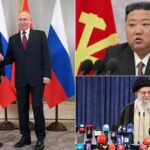Tokyo (12/07 – 25.00) Tributes have been flowing for former Japanese prime Minister Shinzo Abe who was assassinated on 8 July. He is being remembered for his many policy achievements both domestic and foreign, for his global leadership and for the warm and memorable relations that he built with past and present world leaders — including Narendra Modi, Malcolm Turnbull, Donald Trump, Joe Biden Jr. and even Xi Jingping. Many key figures, including Vladimir Putin, whom Abe made a special effort to cultivate, have joined the chorus of those publicly mourning his passing.
Abe will also be forever remembered for conceptualising and undertaking key policy initiatives such as ‘Abenomics’, the Quadrilateral Security Dialogue and the ‘Free and Open Indo-Pacific’. These security concepts have since entered common parlance amongst regional and global leaders and represent a lasting strategic legacy.
But Abe’s strategic mission to ‘normalise’ Japan’s place in the world through constitutional recognition of its armed forces remained a work in progress. Increasingly, this long-held desire became a product not only of his historical nationalism but also a realist calculation of Japan’s expanding security imperatives.
When Abe died, he was building a wave of change in Japan’s defence policy as the primary ‘influencer’ of the Kishida government — a role facilitated by his leadership of the largest faction in the Liberal Democratic Party (LDP) — as well as continuing to make active policy proposals in a range of other fields. Abe also broadened his area of operations as a leading spokesperson for Japan on the regional and world stage — in international interviews and meetings — continuing to maintain and even raise his policy profile, both domestically and abroad. Although formally ‘out of power’, his domestic and international presence only increased.
But what made Abe really stand out from his peers was the depth of his commitment to specific policy goals as a ‘conviction politician’. Former Japanese LDP politician Kensuke Miyazaki highlighted this aspect of Abe’s political style — his steadfast determination to achieve long-held goals, which affected his whole approach to politics and conduct as a politician.

Abe was not afraid of creating domestic and international waves, and political and popular divisions in order to achieve these goals. In fact, he regarded political obstacles and popular resistance as an inevitable part of domestic politics and the conduct of international relations. He never relinquished his cherished objectives and consistently pursued them throughout his political career. The most important of these was constitutional reform, which Japan may be now closer than ever to achieving, particularly given that the four parties in favour of constitutional revision have secured a two-thirds majority in the Upper House in the 10 July election.
Abe also changed the nature of the policy process in order to facilitate the achievement of immediate policy objectives in the same way that he built warm relationships with other leaders for the same ends.
As primarily a goal-driven politician, Abe exemplified a different style of politics from the vast majority of his peers whose skills were directed to achieving their own political success and short-term ambitions rather than long-cherished policy objectives. In short, they were focused primarily on their success in politics as a career, whereas, for Abe, a career in politics was a means to an end — the realisation of specific policy goals and ambitions.
He was even prepared to breach policy taboos, such as proposing that Japan engage in a discussion on ‘nuclear sharing’ where ‘US nuclear weapons are deployed and jointly operated within one’s own country’ in order to tackle long-standing policy taboos. In fact, when he first raised this topic on a TV program, he insisted that ‘discussion without taboos’ was necessary. Abe was equally outspoken on Taiwan, describing the US policy of ‘strategic ambiguity’ as dangerous and China as ‘a believer in force’. His role as a ‘politician at large’ without formal office in the Kishida administration gave him more freedom to speak out than he had while in power.
Abe also anticipated and expected and even welcomed the many political and policy obstacles that he considered lay in the path of his ambitions. Miyazaki recalled him saying: ‘Politics is not just about playing politics to the people’s liking. The meaning of a Diet member’s existence lies in raising issues that divide opinions, getting the public to think about them, and sparking debate’.
Miyazaki interpreted this as Abe saying, ‘we have to make an enemy of half of the people, stir up debate, and open the way’, even if it is a tough and painful thing to do and one that requires a great deal of determination. In his view, Abe was one of the few politicians who showed the spirit and will, even to the extent of risking his own life to change the country, such was the strength of his conviction — a rare commodity amongst Japanese politicians more generally.
On many of these issues, Japan will now be effectively leaderless. No one can fill his shoes. He will be mourned by many — both Japanese citizens and those in other countries who have followed his career and who will continue to miss his input into domestic and international discourse.















